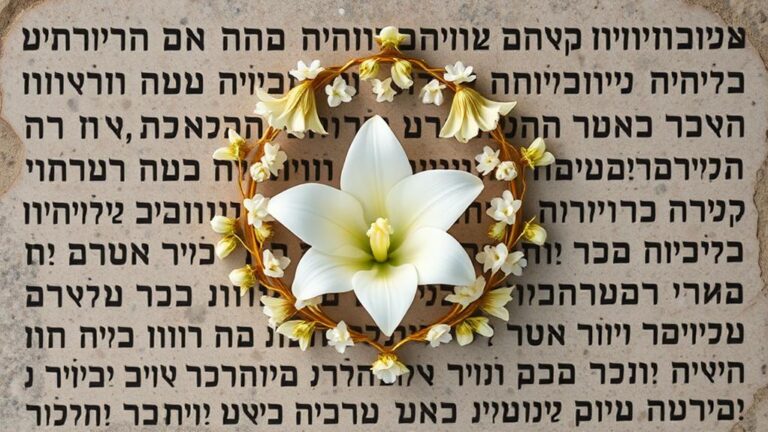Huldah Name Meaning in the Bible
Huldah, a prophetess in the Hebrew Bible, derives her name from the Hebrew word *ḥuldāh*, meaning “weasel” or “mole.” This etymology symbolizes durability, persistence, and spiritual depth, underscoring her pivotal role in delivering essential messages from God to the leaders of Judah. As a key figure during the reign of King Josiah, Huldah interpreted God’s word and conveyed divine judgment, emphasizing the importance of following God’s law. Her prophecy not only predicted destruction for Judah due to idolatry but also offered redemption to King Josiah, showcasing her profound spiritual insight and authority. Exploring her legacy further reveals deeper insights into God’s engagement with His people and the critical role of prophets in guiding ancient Israel.
Key Takeaways
- Huldah’s Name Meaning: Derived from the Hebrew word meaning “weasel” or “mole,” symbolizing durability, persistence, and spiritual depth.
- Etymological Origin: The name Huldah also connects to the Hebrew lemma meaning “to abide” or “to continue,” associating it with authority and obedience.
- Biblical Significance: Huldah was a prophetess in the Old Testament, delivering essential messages from God to leaders of Judah, emphasizing the importance of following God’s law.
- Prophetic Role: She interpreted God’s word, conveyed divine judgment, and helped spur King Josiah’s reforms in Judah, grounding her message in the Book of the Law.
- Symbolic Representation: Huldah’s name represents reconnection to the earth and the natural world, symbolizing authority, obedience, and spiritual connection in a biblical context.
The Hebrew Origin of Huldah

Huldah’s name carries significant Biblical significance. It not only reflects her Hebrew origins but also symbolizes the spiritual and prophetic role she played in the Bible. As a prophetess, Huldah delivered pivotal messages from God to the leaders of Judah, emphasizing the importance of following God’s law and warning of impending judgments for disobedience.
The qualities of strength and resilience found in names like Huldah resonate deeply with biblical themes of courage and faith. The Hebrew origin of Huldah underscores the rich cultural and religious context of the name, highlighting its connection to the Old Testament and its significance within the biblical narrative.
This understanding provides a deeper appreciation for the name Huldah, beyond its literal meaning, and into its symbolic and spiritual significance within the Hebrew traditions.
The Prophetic Role of Huldah
Receiving and interpreting divine guidance, Huldah played a pivotal role as a prophetess during a critical period in the history of Judah. Her prophetic authority was recognized by King Josiah and his advisors, who sought her counsel after discovering the lost Book of the Law during renovations on Solomon’s Temple. Huldah’s ability to interpret God’s word and convey divine judgment underscored her significant position in biblical times, reflecting the spiritual importance of leadership in shaping the moral compass of a nation.
Huldah’s prophetic role challenges traditional gender dynamics, as she exercised spiritual authority in a male-dominated culture. Despite her marital status as the wife of Shallum, keeper of the king’s robes, her prophetic gifts earned her a place of reverence and respect from the king and his officials. Her message, derived from God’s word, emphasized the consequences of idolatry and the importance of repentance.
Through her prophetic interpretation, she helped spur King Josiah’s reforms in Judah, highlighting the spiritual insight and authority she possessed. Huldah’s legacy as a prophetess serves as a powerful example of gender inclusivity and the impact of divine guidance on societal changes.
Meaning of Huldah in Hebrew

The name Huldah originates from the Hebrew language, specifically from the word “חֻלְדָה” (חֻלְדָה), which is associated with the root word “חולדה” (חולדה), meaning “weasel” or “mole.” This term can be interpreted symbolically, conveying meanings such as durability, persistence, and spiritual depth, reflecting Huldah’s role as a prophetess in the Hebrew Bible who was known for her authoritative and impactful prophecies.
Huldah’s significance is further emphasized through her embodiment of virtues like diligence and wisdom, particularly evident in her interactions with King Josiah and her critical role in interpreting the Book of the Law. In the biblical context, Huldah’s name underscores her importance as a figure of spiritual insight and wisdom.
Hebrew Name Origin
Here are key aspects of Huldah’s Hebrew name origin:
- 1. Etymology: Derived from the Hebrew word חלד (*ḥoled*), meaning weasel or mole, emphasizing a connection to the earth.
- 2. Cultural Significance: As a prophetess, Huldah played a pivotal role in biblical history, guiding King Josiah and shaping the fate of Judah.
- 3. Linguistic Connections: The name Huldah is linked to other Hebrew words, such as חלד (*holed*) and חלד (*heled*), which respectively denote burrowing animals and human life on earth.
- 4. Symbolism: Huldah’s name symbolizes spiritual insight, wisdom, and authority, making it a meaningful choice for parents seeking a name with deep biblical roots.
Biblical Context Explained
Embedded within the rich tapestry of the Hebrew Bible, the name Huldah offers a fascinating case study of etymological depth and cultural significance.
The term “Huldah” originates from the Hebrew word חֻלְדָּה (ḥuldāh), which can be translated to mean “weasel” or “mole,” yet its historical and cultural relevance far surpasses these literal interpretations. In the biblical context, Huldah is prominently featured in 2 Kings 22:14 and 2 Chronicles 34:22, where she is depicted as a prophetess during the reign of King Josiah. Huldah’s name, much like the name Robert, symbolizes strength and leadership, reflecting the values of courage and wisdom that are essential in biblical narratives. Her role as a prophetess demonstrates the importance of divine communication and the inclusion of women in spiritual authority, paralleling the enduring legacy of strength and leadership seen in biblical figures.
Huldah’s significance lies in her prophetic role, delivering a message from God to King Josiah regarding the fate of Judah due to their disobedience. Her prophecy not only underscores the importance of adherence to the Law but also highlights God’s willingness to spare the righteous king from witnessing the impending disaster.
The historical significance of Huldah’s name is anchored in her authoritative position as a prophetess, reflecting a deep connection with God and her ability to interpret divine will. This cultural relevance underscores the inclusivity of prophetic roles in the Hebrew Bible, illustrating that both men and women were chosen by God to convey His messages.
Symbolic Interpretations**
Understanding the symbolic interpretations of Huldah’s name in Hebrew provides valuable insight into her prophetic role in the Hebrew Bible.
The name Huldah is derived from the Hebrew lemma חלד (halad), which means “to abide” or “to continue,” signifying her role as a steadfast spiritual guide and messenger of divine authority. This interpretation underscores the significance of feminine empowerment in biblical contexts, where Huldah’s prophetic voice played a pivotal role in shaping Israel’s spiritual landscape.
Key Symbolic Interpretations of Huldah’s Name:
- Grounded Continuity: Huldah’s name symbolizes a connection to the earth and human life, emphasizing the importance of grounded spiritual practices.
- Prophetic Authority: Her role as a prophetess represents the spiritual significance of gender equality in divine communication, showcasing that both men and women can serve as messengers of God.
- Moral Stability: The name Huldah conveys a sense of moral stability, reflecting her commitment to guiding the people towards the right path.
- Divine Guidance: Her prophetic role underscores the spiritual significance of seeking divine guidance, emphasizing the importance of turning to prophets who can provide insight into God’s will.
The Significance of Huldah in Scripture
Huldah’s prophetic role in the Bible is a [SIGNIFICANT] to the [IMPORTANCE] of her name and the authority she held.
As a prophetess, she delivered [ESSENTIAL] messages from God to the leaders of Judah, specifically King Josiah, concerning the fate of their nation due to their disobedience.
Her name, derived from the Hebrew word meaning “weasel” or “mole,” also symbolizes her unique position as a spiritual leader who provided insight and wisdom in a [DECISIVE] moment in biblical history.
Huldah’s Prophetic Role
In the Old Scripture, a pivotal figure emerges in the narrative of 2 Kings and 2 Chronicles: Huldah, the prophetess. Her role is characterized by prophetic significance, as she delivers God’s word to King Josiah and the priests of her time. Huldah’s prophetic message was essential in guiding the king’s reforms in Judah, emphasizing the importance of adherence to God’s law and condemning idolatry.
The following points highlight the key aspects of Huldah’s prophetic role:
- Authority and Influence: Huldah was consulted by King Josiah and the high priest Hilkiah, demonstrating her stature as a prophetess in a male-dominated culture.
- Covenant Renewal: Her prophecy spurred King Josiah to renew the covenant with God, leading to extensive religious reforms.
- Biblical Interpretation: Huldah’s message was firmly grounded in the Book of the Law, emphasizing the consequences of disobedience and the importance of faithful adherence to God’s word.
- Divine Mercy: Through her prophecy, God extended grace to King Josiah, sparing him from witnessing the destruction of Judah due to his repentance and humility.
Symbolism of Her Name**
Delving into the symbolism of Huldah’s name reveals a rich tapestry of meaning, rooted in the Hebrew word חֻלְדָּה (*Ḥuldāh*). This name, derived from the word חֹלֶד (*ḥoled*), meaning “weasel” or “mole,” holds significant biblical and cultural relevance. Beyond its literal translation, it symbolizes spiritual depth and insight.
The name Huldah represents reconnection to the earth and the natural world, as these animals burrow and thrive underground. This spiritual connection highlights Huldah’s prophetic role in delivering divine messages regarding the fate of Judah. Her words served as both a warning of impending disaster and a message of hope, assuring King Josiah of his personal salvation due to his humility and repentance.
In the context of the Hebrew Bible, Huldah’s name not only reflects her prophetic mission but also her authority and obedience. Her prophetic voice embodies the tradition of divine communication, underscoring the inclusivity of God’s calling and the importance of obedience and repentance. This profound symbolism underscores Huldah’s pivotal role in biblical history, emphasizing the enduring message of faithfulness and redemption in God’s relationship with His people.
Huldah’s Message to King Josiah

- Warning of Disaster: Huldah conveyed the Lord’s anger against the Israelites for their idolatry and disobedience, declaring that disaster would befall the land and its people.
- Promise to King Josiah: However, Huldah also assured King Josiah that because of his humility and repentance, he would be spared from seeing the impending disaster. The Lord would gather him to his ancestors, and he would be buried in peace.
- King Josiah’s Response: Upon hearing Huldah’s message, King Josiah called a meeting with all of Judah to read the covenant aloud and renew their commitment to God’s laws.
- Impact on Israelites: This led to a significant revival, with the eradication of idolatry and a renewed covenant between the people and God, aligning them with divine commands.
Huldah’s Place in Biblical History
Huldah’s prophetic role situates her at a pivotal moment in biblical history, bridging the message of God’s wrath against Judah’s disobedience with a promise of mercy for King Josiah. Her significance extends beyond her immediate context to offer insights into God’s engagement with His people during a time of spiritual decline. Huldah’s prophetic ministry, as detailed in 2 Kings 22 and 2 Chronicles 34, underscores the importance of divine guidance and the need for repentance and humility before God.
Huldah’s historical significance is also reflected in her role as a female prophetess, one of the few recognized in the Old Scriptures. Her prophetic role demonstrates the inclusivity of God’s calling and the variety of voices through which God communicates His will. The Huldah Gates in the Temple Mount in Jerusalem, named in her honor, further affirm her enduring impact on biblical history and tradition. Through her prophecy, Huldah illustrates God’s balance between justice and mercy, emphasizing the need for obedience and the promise of redemption available to those who seek it with a humble heart.
Her message continues to inspire reflection on spiritual depth and the importance of biblical interpretation.
Spiritual Depth of Huldah’s Name

- Spiritual Insight: Huldah’s role as a prophetess underscores her ability to discern and interpret divine messages, highlighting her spiritual insight and biblical interpretation skills.
- Prophetic Wisdom: Her prophetic wisdom was guided by divine inspiration, as evidenced by her ability to deliver important messages from God to King Josiah and the people of Judah.
- Authority and Respect: Huldah’s influence extended beyond her prophetic role, commanding respect from high-ranking officials and the king himself, demonstrating her significant spiritual authority.
- Divine Connection: Her prophetic messages, as recorded in 2 Kings 22 and 2 Chronicles 34, underscore her deep connection with the divine, embodying the essence of her name by persevering in her faith and delivering God’s word with courage and conviction.
Interpretations of Huldah’s Prophecy
Huldah’s prophecy, detailed in 2 Kings 22:14-20 and 2 Chronicles 34:22-28, pronounces God’s wrath upon Judah for their idolatry, predicting the destruction of Jerusalem as a fulfillment of the curses written in the Book of the Law. However, it also offers redemption to King Josiah, stating that because of his humility and piety, he would be spared the impending disaster and die in peace.
This prophecy highlights gender dynamics, as Huldah, a woman, is recognized as a credible emissary of God’s word. The religious significance of her prophecy lies in its affirmation of the importance of obeying God’s laws and its emphasis on individual responsibility and divine justice.
Huldah’s message underscores the critical role of prophets in guiding the spiritual and political paths of ancient Israel.
Huldah’s Legacy in Christian Context**

A distinct and pivotal figure in the biblical narrative, Huldah’s prophetic legacy extends beyond her historical context to influence Christian theology and understanding. Her role as a prophetess who delivered God’s message to King Josiah and the people of Judah underscores the inclusivity of divine communication, emphasizing that God can speak through various voices, including those of women. This inclusivity is a cornerstone of her prophetic legacy, contributing significantly to Christian influence.
Key Aspects of Huldah’s Legacy:
- Validation of Divine Communication: Huldah’s authentication of the Book of the Law as God’s word underscored the authority and importance of scripture, shaping the religious reforms under King Josiah and influencing the broader Christian view of scripture’s divine origin.
- Courage and Faithfulness: Her unwavering courage in delivering a difficult message emphasizes the importance of speaking truth, even in adversity, inspiring believers to stand firm in their faith.
- Influence on Spiritual Renewal: By guiding the nation back to its religious roots, Huldah’s prophecy fostered a deeper understanding of the spiritual depth required for true worship and repentance, illuminating the path to genuine spiritual renewal.
- Biblical Significance: As a female prophet, Huldah’s story challenges traditional perceptions of gender roles in the faith community, highlighting the biblical significance of women’s contributions to religious and prophetic traditions.
Frequently Asked Questions
Is Huldah a Popular Name in Modern Times?
Huldah, a name with deep biblical origins and historical significance, is not particularly popular in modern times, ranking #14012 in U.S. births for girls, indicating a rare and distinctive choice for those seeking a name rooted in tradition.
Can Huldah Be Used as a Boy’s Name?
Surprisingly, in 1900, 23 girls were named Huldah, peaking its popularity. However, given its historical significance as a prophetess in the Bible, using Huldah as a boy’s name could blur traditional gender lines, embracing modern gender neutrality in names.
How Do You Pronounce the Name Huldah?
Pronouncing the name Huldah: The name Huldah is pronounced as HUHL-duh. Derived from Hebrew origins with historical significance, it references a prophetess in the Old Scripture, highlighting its rich cultural and biblical heritage.
What Other Names Are Similar to Huldah?
As we ponder the mysteries of biblical names, what secrets do they hold about our ancestors’ identities? Names similar to Huldah, such as Hannah and Hadassah, share Hebrew origins, while Deborah and Abigail embody strong feminine virtues, blurring the lines between gender-neutral and traditionally female names in biblical contexts.
Are There Any Variations of the Name Huldah?**
Huldah has several variations including Hulda and Chuldah, stemming from its Hebrew origin. The name also has cultural significance in Norse mythology and Old Swedish, where it means secrecy, sweet, or lovable, reflecting diverse interpretations and meanings.
Biblical Names of Strength and Faith
- Eleazar Name Meaning in the Bible
- Hannah Name Meaning in the Bible
- Huldah Name Meaning in the Bible
- Taliyah Name Meaning in the Bible
- Tristan Name Meaning in the Bible
Conclusion
The name Huldah, derived from the Hebrew חלדה (ḥuldāh), symbolizes profound spiritual insight and wisdom. In the Bible, Huldah is a prophetess who delivered essential messages to King Josiah and the people of Judah, emphasizing the importance of obedience and humility. Her prophetic role underscores God’s consistent communication with His people through various voices. Remarkably, Huldah’s message influenced a significant turning point in Judah’s history, making her one of the few female prophets acknowledged in the Old Testament. Her legacy serves as a declaration of God’s inclusivity and responsiveness to His people’s hearts.






